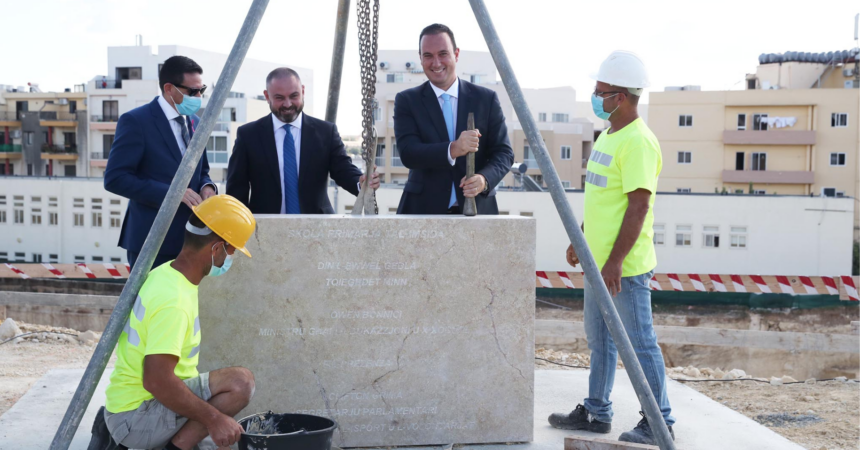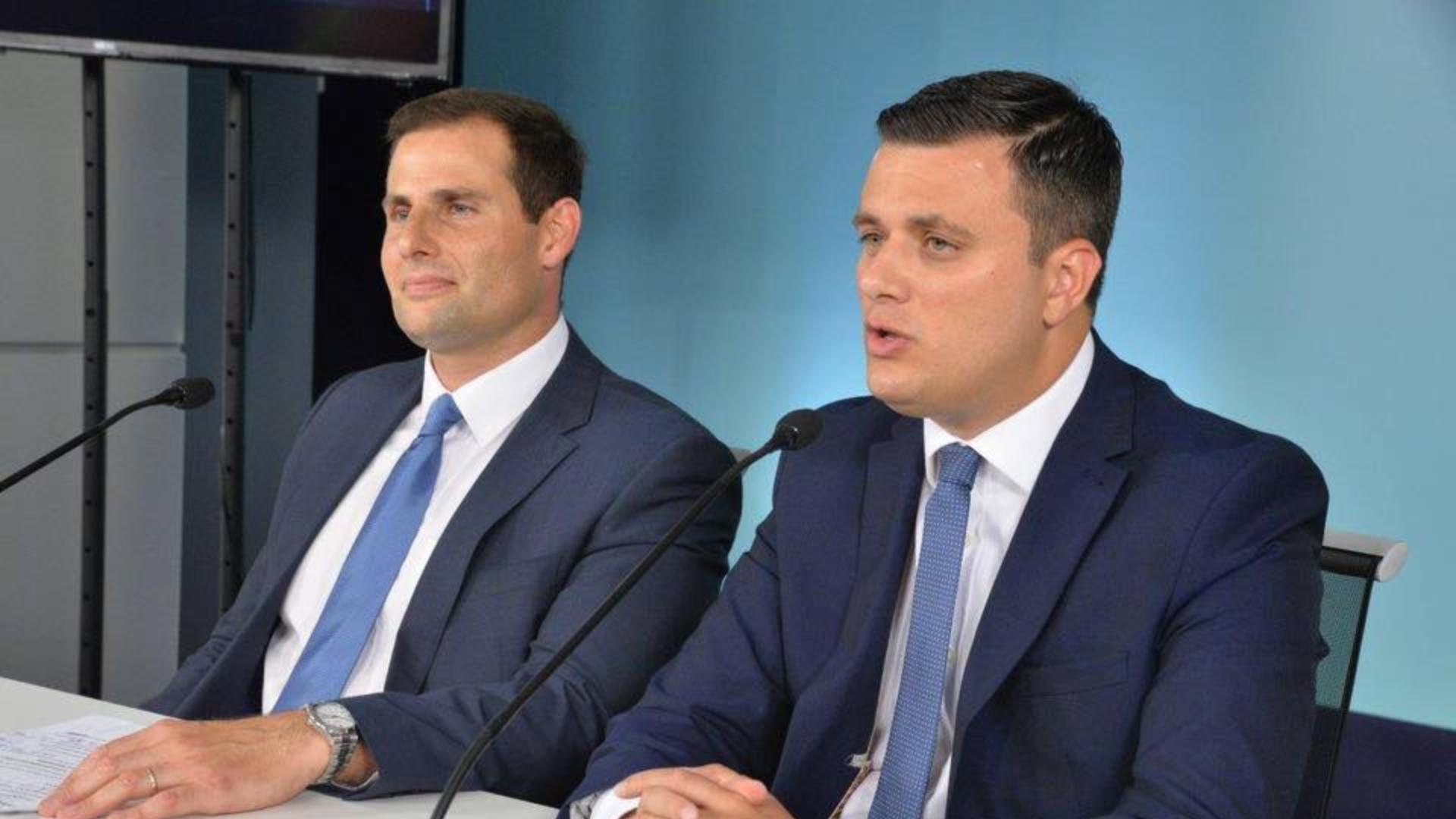Malta has slipped the new €7 million price tag for the new Msida primary school, a project first announced in 2017, into the EU’s Recovery and Resilience Facility.
It has done so despite its earlier failed attempts to have old projects included in the new funding and MEPs’ recent warning about attempts by member states to finance national spending with recovery funds.
The project has been a comedy of errors since it was first announced in 2017. Work on the school had begun in 2018 but the structure had to be demolished halfway through after severe structural defects became apparent.
With the original €3.3 million tender down the drain and with the project at a stalemate since then, the government doubled the price tag and last week awarded a new €7 million contract to PRA Construction Ltd – run by Gozitan construction magnate Joseph Portelli and his partners Daniel Refalo and Mark Agius – by direct order.
The government now appears to have found a fix for the €3.3 million it has presumably lost when the original structure was demolished, as well as for the new twice-as-high €7 million contract by slipping the project’s funding into the EU’s Recovery and Resilience Facility.
According to an official EU tender award notice, the project is now being EU funded through Malta’s RRP (Recovery and Resilience Plan).
The European Parliament, which is keeping a close eye on how member states are spending the post-Covid recovery funds, recently expressed concern over “first indications” that “some EU countries” may be seeking to use post-Covid recovery funding to replace national expenditure rather than for the reforms and investments set out in national RRF plans.
They also requested introducing a fraud reporting mechanism, reporting to the Commission and the European Public Prosecutor’s Office.
The European Public Prosecutor’s Office (EPPO) opened 14 investigations into the suspected fraud of EU funds in Malta last year worth an estimated €123.5 million.
All 14 investigations were active at the end of last year. The EPPO does not make the details of the investigations it conducts public but gives general indications.
The EPPO has five ongoing expenditure investigations in Malta. Three deal with agricultural and rural development programmes, one with maritime and fisheries programmes, and another related to mobility and transport, energy, and digitalisation programmes.
While the MEPs on the committee responsible for discharging EU funds did not mention Malta specifically, or any other country for that matter, Malta’s handling of its €316 million slice of the pan-EU post-Covid recovery funding facility is clearly in their sights.
Malta tried to have regular national expenditure included in RRF
That is because when it comes to their concerns about some countries attempting to use RRF funds to replace national expenditure, Malta has made a past attempt to have the practice enshrined in the facility itself.
It was recently uncovered how the Maltese delegation negotiating the country’s prospective funding from the EU’s €700 billion RRF fund had lobbied to include old projects – such as the Msida primary school – in its funding programme.
The finding comes from an ‘access to documents’ request from Follow the Money for the EU Council’s 250-page document containing member states’ positions on the then-draft regulation.
The document shows how the Maltese delegation contended, “We feel that the concept of retroactive eligibility should be taken into consideration, thus allowing member states sufficient flexibility to include proposals for reforms that would have already taken place.”
The line of reasoning flies in the face of the RRF’s stipulation that payments through the programme are conditional on the pledged reforms achieved.
The document shows diplomats from France, Cyprus, Latvia and Hungary joined Malta in lobbying for the inclusion of projects already underway, completed or near completion in the new funding.
Budgetary Control Committee members have also called on the European Commission to carry out additional checks to prevent that from happening.
Malta recently received its first RRF payment of €53.3 million out of a total of €316 million allocated for the country.
ECA raises red flags on Malta’s direct orders
According to MEPs, since the RRF was set up “under time pressure”, control requirements are lighter than those for other EU programmes such as those related to for cohesion and agriculture funds.
A recent European Court of Auditors report European Court of Auditors found red flags concerning Malta and its agriculture and cohesion policy spending – one of the EU’s biggest spending areas –in the public procurement process, which could lead to conflicts of interest.
The ECA has flagged how the same contractors are repeatedly winning tenders from a particular contracting authority in Malta.
It also raised Malta’s departure from standard tendering procedures without good reason, such as choosing a negotiated procedure (direct order) when an open procedure could have been used.
The ECA report referred to the 2019 annual report by Malta’s National Audit Office (NAO), which had raised several concerns about the country’s public procurement process, particularly when using direct orders without the necessary approvals and the lack of publication in the dedicated journal.
The Msida school project involves EU funds and the contract award notice is listed as ‘Negotiated Procedure for the Design and Build Contract for the Verification of the Constructed Structure of the New Msida Primary School and the Completion of the Construction of the School (Phase 1)’.

An artist’s impression of the new Msida Primary School, which should have been opened in 2019.
In EU terms, negotiated procedure without prior publication means a direct order and, according to EU rules, can be used for public works in certain instances and when “the works can be supplied only by a particular economic operator”.
It is also applied when “no reasonable alternative or substitute exists and the absence of competition is not the result of an artificial narrowing down of the parameters of the procurement”.
According to the government’s justification, there was an “absence of competition for technical reasons”.
The contract, according to the official notice, will “extend the terms of the services/works to be provided by the Contractor to cover all the school area under a design and built basis whereby the Contractor will be requested to provide the 15 years’ structural warranty through his appointed architect”.














The European Public Prosecutor’s Office (EPPO) opened 14 investigations into the suspected fraud of EU funds in Malta last year worth an estimated €123.5 million.
About flippin time – Money and other subsidies coming from EU are enhancing corruption in mafiamalta.
Surprising the MLP crooks didn’t steal the money to (once again) bail out KM.- or maybe they did use it for the very generous severance packages. EU please note!
How right Alfred Sant was when he had said ‘u mbaghad inbazwru l’hawn u nbazwru l’hemm”.
That is exactly what the government is doing, however with tens of millions and not the 1.5 million Alfred Sant had said that we would receive from our membership of the EU.
It is becoming sickening to read about the deep crookedness of our government in manipulating funds allocated for special purposes.
‘Malta the cowboy island’ should be the front page title of our business and touristic magazines and journals.
Ah noddy in the photo above had to be involved, the man (sic) would attend the opening of a fridge door if he knew a camera would be there?